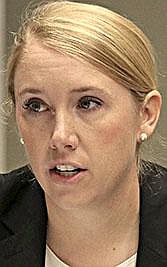The Arkansas Board of Education member who last week made motions to approve the framework for reconstituting the Little Rock School District as well as ending collective bargaining with the teachers association elaborated Wednesday on her intent.
"I wanted to see a model where we could provide a laser focus on the lowest-performing schools," Sarah Moore of Stuttgart said about the state's newly approved framework plan to be used if the capital city's system does not meet state-set criteria for exiting five years of state control.
"I'm not asking for a charter school to come in," Moore said in an interview about the oversight for what would be labeled Category 3 schools under the framework plan.
Moore made the comments on the same day the Little Rock Education Association, a union of the district's teachers and support staff, held a private membership meeting on possible ways to respond to state Education Board actions.
Also Wednesday, a response to an Arkansas Freedom of Information Act request to the state showed that the Little Rock district has taken initial steps to organize the election of two personnel policies committees -- one for teachers and one for the support staff. The district has reached out to the American Arbitration Association of New York City to oversee elections of the committees, the role of which would be to advise the Little Rock district on employee-related matters if the employee association loses its exclusive contract-bargaining rights.
"All I can say is we are disappointed with the motions by the state board because the LREA has worked collaboratively with the district from the state takeover with every superintendent to make sure this district operated smoothly and effectively," Teresa Knapp Gordon, president of the employee organization, said after the membership meeting at First United Methodist Church.
"I don't know what else to say other than if it comes to it, we will stand up for our kids. Our kids are not for sale in Little Rock," she said.
"It hurts my heart that the state Education Board wants to divide us, and to insinuate that teachers are at fault is disrespectful and dishonest," she added.
The organization will hold an informational meeting for the public at 6 p.m. Monday at the downtown church.
The framework plan for returning the state-controlled district to the operation of a locally elected board, with some limits, calls in part for any schools that receive an F grade from the state this year to "operate under different leadership than the remaining schools in the district but in partnership with the district."
The framework plan -- still to be fleshed out by the Education Board in the coming weeks -- does not yet define what "different leadership" might be for the F-grade schools.
The current F-grade schools are J.A. Fair, McClellan and Hall high schools; Cloverdale Middle; and Bale, Romine, Stephens and Washington elementaries.
"I think the state board as a whole wants these schools to remain a part of the Little Rock School District -- as in that student [in a Category 3 school] is a Little Rock district student" and will matriculate or proceed to other Little Rock district schools "if that is their choice," said Moore, the state Education Board member.
"But, the governance ... will be a leader who is focused on the six or eight schools, or however many there are, working with those principals and those teachers."
The framework plan, publicized for the first time and approved at a quickly called special meeting of the Education Board on Friday morning, states that schools that make a D or better state grade this year will operate under a locally elected nine-member school board. Those would be Category 1 schools.
Category 2 schools would be those undergoing reconfiguration and "may operate under the elected nine-member board -- the State Education Board will determine which schools are in that category."
The Little Rock district will be consolidating, closing, and/or repurposing several schools over the next couple of years as the result of the opening of the new Southwest High School and the multiyear declines in student enrollment.
Both Fair and McClellan will be closed after this school year, with those students being assigned to Southwest. Romine is also scheduled to be closed, with pupils being sent to a new kindergarten-through-eighth-grade school at the Fair campus. Plans also call for reassigning some 300 Hall High students to the new Southwest High.
Critics of the framework plan contend that it will racially and socioeconomically divide the district, resegregating a system that attracted international attention in 1957 when nine black students were initially barred from attending the all-white Central High and eventually had to be escorted in by federal troops.
Moore, a Little Rock native who has been on the state Education Board for just over a year and who formerly worked for three years as an education policy adviser to Gov. Asa Hutchinson, disputed that the district would be divided up.
"There is a lot of public sentiment right now that the whole district is going to be chopped up when in reality we are talking about a handful of schools," she said.
The 2019 A-to-F letter grades and any resulting Category 3 schools won't be known until the middle of October, but it is already known, she said, that Fair and McClellan won't be in the category since they are closing.
"We need to get out to the public that we are not chopping up the district into two big segments, but we are providing focus on these lowest-performing schools," she said.
Moore suggested that a leader for Category 3 schools could make available expanded services to students, such as establishing an extended school day or an extended school year, or creating alternative pay models for teachers.
"This kind of category would allow that to happen at a much quicker rate than within the broader district bureaucracy," she said.
Asked who the leader would be and whether it might be a state official, Moore said she didn't know but that "the idea is to have someone over decision-making and accountable for these schools, specifically."
Moore also made the motion last week to discontinue recognizing the Little Rock Education Association as the exclusive contract-bargaining agent for employees. The motion was tabled until the Education Board's Oct. 10 meeting, but the board directed that steps be taken to employ a third party to oversee the election of teachers to a personnel policies committee. In other Arkansas school districts, personnel policies committees advise school boards on teacher-related issues.
Moore said the Little Rock district is the only one in the state to engage in collective bargaining.
"I think there is a place for the union," she said. "I think the LREA, the [Arkansas Education Association], the Arkansas State Teachers Association and any other professional organization, still needs to continue to provide support to the teachers. I think it is important, the development they do, the support they do and the protections they provide. But I don't think the negotiated contract is in the best interest moving forward."
She cited as an example the Little Rock teacher salary schedule, which she said is reflective of the union's needs but not conducive to attracting and retaining new and young teachers. Starting salaries in the district fall as much as $12,000 below the Springdale School District's starting salary and $6,000 below the starting salary in Conway, even though the Little Rock district spends $3,000 to $4,000 more per student than those districts. That's not going into the salaries of Little Rock teachers, she said.
Gordon, the Little Rock Education Association leader, said the Little Rock and Springdale districts are different in that Little Rock is an urban district with urban issues.
"Everything we do as a union is for better learning conditions and better teaching conditions," Gordon said.
In regard to establishing a policy for setting up personnel policies committees and the elections of those committee members, Education Secretary Johnny Key advised Little Rock School District Superintendent Mike Poore in an email this week that the state law requires teachers to conduct the elections.
"[T]here may be some areas of concern related to the statutory requirement that teachers administer the election," Key wrote to Poore. "There is an argument that the state board's action was an implied waiver of this law, which is something we are discussing with ADE Legal. At this point we can't move forward until we get it cleared up."
"Understand," Poore responded.
Metro on 09/26/2019

